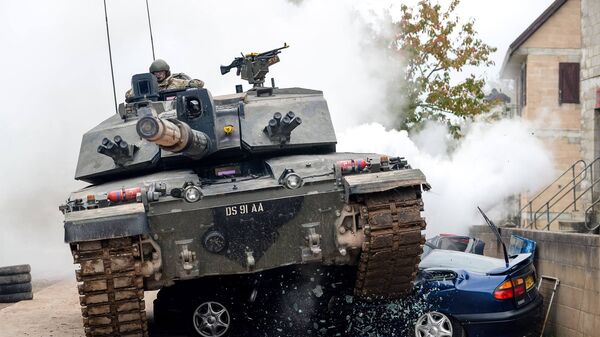The UK Defence Secretary, Ben Wallis, has rejected reports that the British army is set to dispose of all of its battle tanks.
Speaking to the BBC during a visit to the Middle East, Mr Wallis said that, “the idea that tanks won’t be there for the Army, upgraded and modernised, is wrong.”
The comment by Britain’s defence chief comes not long after a report by The Times at the end of August claimed that the UK government had “drawn up plans to mothball all of Britain’s tanks” as part of what it described as “radical proposals to modernise the armed forces.”
The Times added that Britain’s leading defence officials were looking to re-channel investment into cybercapabilities in recognition of “the changing character of warfare.”
Although Mr Wallis may have brought down the cosh on that report, he did say that as part of the government’s ongoing defence review, the UK would be “letting go” of some outdated military equipment.
Boris Johnson’s government is currently conducting an integrated defence and security review, which it has described as the largest defence review since the end of the Cold War.
Mr Wallace also told the BBC that there would be a ramping up of the UK’s forward-deployed military forces on a global scale. He noted that a joint squadron of Royal Air Force jets would be based in Qatar in time for the 2022 World Cup. He also announced that the UK would be investing £23.8 million in a “logistics hub” at the Duqm port in Oman in order to triple the size of the UK’s base there, which may end up being used as a new base for the Royal Navy’s expanding aircraft carrier fleet.
“We’re going to make sure we [the UK] have an armed forces fit for the 21st century and meets our obligations to NATO and elsewhere… We are not scrapping all the British Army’s tanks and we will make sure the ones we maintain are up to date, lethal and defendable,” Mr Wallis said.
The comments come amidst a cascade of reports over the past few years listing a steady litany of crises facing the UK’s armed forces.
Back in 2019, MoD figures revelled that the Royal Navy and Royal Marines were 1,230 men short of their 20,450 personnel target. The Royal Air Force was 1,740 personnel short of its 31,750 target. Yet, The Army was a staggering 6,930 men short of its 82,000 personnel target. Figures obtained by The Guardian that year also revealed that frontline combat units were operating without as much as 40% of their manpower.
Some of the reasons widely credited with explaining the UK military’s - but particularly the The Army’s - dwindling personnel numbers are the winding down of the wars in Iraq and Afghanistan, a relatively stable economy, an ageing population and a youth demographic that is less interested in enlisting into the military than past generations.


